* You are viewing Posts Tagged ‘Networks’
Paper proposals are invited for a one-day colloquium on Translation and Translators in the Circulation of Knowledge in Early Modern Science, which will take place at London’s Warburg Institute on Friday 28 June 2013. The event ‘will explore the role of translation in early modern science, providing a forum for discussion about translations as well as the translators, mediators, agents, and interpreters whose role in the intellectual history of the period remains ill defined and deserves greater attention’. Suggested topics include the philosophy and theory of translation; the ‘professional translator’; the function and use of translations; auxiliary languages; translation in learned correspondence; the readers of translations; and informal translations (adaptations, paraphrases).
The deadline for proposals for 25-minute papers and full panels is 28 February 2013. For further details and submission instructions, see the colloquium webpage.
James Brown
December 14, 2012
Podcasts, Projects and Centres, Publications, Websites and Databases
Tags: Archives, Centre for Editing Lives and Letters, Diplomatic History, England, Materiality, Networks, Seventeenth Century, Sixteenth Century, Union Catalogue
 Those seeking to balance the port and mince pies this holiday season with some state-of-the-art reflections on early modern epistolarity are in luck: the latest issue of Lives & Letters – the free online journal of UCL’s Centre for Editing Lives and Letters – is devoted to New Directions in the Study of Early Modern Correspondence.
Those seeking to balance the port and mince pies this holiday season with some state-of-the-art reflections on early modern epistolarity are in luck: the latest issue of Lives & Letters – the free online journal of UCL’s Centre for Editing Lives and Letters – is devoted to New Directions in the Study of Early Modern Correspondence.
Guest-edited by James Daybell and Andrew Gordon, and developing out of a conference held at Plymouth University in 2011, the issue features an introduction to the latest developments in the field (in which EMLO gets a name-check); eight case studies of particular correspondents and correspondence networks; and a spectacularly useful select bibliography on the manuscript letter in early modern England. All articles are free for download from the journal website. James also contributed to our 2011 seminar series (here’s the podcast), while his latest book on the material letter has just been reviewed by the IHR.
James Brown
November 30, 2012
Calls for Papers, Conferences and Workshops, Events, Projects and Centres
Tags: Book History, Diplomatic History, Gender, Global, History of Scholarship, History of Science, Networks, Religion, Women
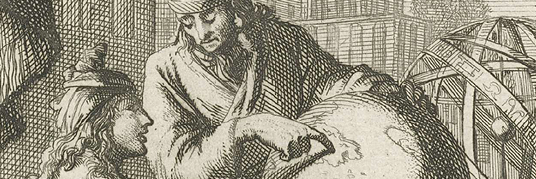 The Centre for Seventeenth-Century Studies at Durham University is seeking papers for a conference on Intellectual Networks in the Long Seventeenth Century (30 June–2 July 2013). The event – which will feature a keynote lecture from our own Howard Hotson – will ‘explore the emergence and consolidation of systems of intellectual and cultural exchange during the long seventeenth century, while assessing their lasting influence on the history of scholarship, literature, diplomacy, science, and religious communities’. Proposals are encouraged on (inter alia) erudite correspondence; academic networks; diplomacy; literary circles; intellectual exchange within religious communities; the book trade; women and intellectual exchange; and popular cultural exchange.
The Centre for Seventeenth-Century Studies at Durham University is seeking papers for a conference on Intellectual Networks in the Long Seventeenth Century (30 June–2 July 2013). The event – which will feature a keynote lecture from our own Howard Hotson – will ‘explore the emergence and consolidation of systems of intellectual and cultural exchange during the long seventeenth century, while assessing their lasting influence on the history of scholarship, literature, diplomacy, science, and religious communities’. Proposals are encouraged on (inter alia) erudite correspondence; academic networks; diplomacy; literary circles; intellectual exchange within religious communities; the book trade; women and intellectual exchange; and popular cultural exchange.
The deadline for proposals for 20-minute papers and full panels is 15 January 2013. For further details and submission instructions, head along to the conference webpage or download the flyer (pdf).
Edited by the Foundations of Modern Thought Research Centre at the University of Bucharest, and featuring our very own Howard Hotson on its Advisory Board, the new publication is billed as a ‘an interdisciplinary, peer-reviewed journal of intellectual history, dedicated to the exploration of the interactions between philosophy, science, and religion in Early Modern Europe’. The epistolary opener features seven contributions (as well as related review essays and book reviews) on particular correspondents and correspondence networks, including an article by Noel Golvers on Sino-European exchanges in the seventeenth and eighteenth centuries; Noel initiated our seminar series in 2010 with a wonderful paper on this topic (listen to the podcast). For full details and to order your copy, visit the journal webpage.
The News Networks in Early Modern Europe research group is seeking papers for its terrific-sounding concluding conference on News and the Shape of Europe, 1500-1750 (Queen Mary, University of London, 26-28 July 2013). Emphasizing the transnational attributes of news networks and their superimposition on pre-existing systems of exchange (physical/logistical, commercial, religious, diplomatic, military, and scholarly), the event 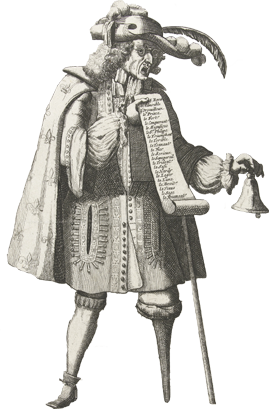 is after contributions on the following themes: ‘International news; networks of news; news in transmission; translating news; war reporting; news from beyond Europe; forms of news; orality/manuscript/print; the uses and afterlives of news; old (and recycled) news; images of news; news and institutions; news and the state; news and the city; news readers’.
is after contributions on the following themes: ‘International news; networks of news; news in transmission; translating news; war reporting; news from beyond Europe; forms of news; orality/manuscript/print; the uses and afterlives of news; old (and recycled) news; images of news; news and institutions; news and the state; news and the city; news readers’.
The deadline for 250-word proposals for communications of twenty minutes is 28 February 2013. For further information, submission instructions, and contact details, head along to the News Networks in Early Modern Europe Blog.
James Brown
October 16, 2012
Conferences and Workshops, Events, Front Page, Project Updates
Tags: Book History, Global, History of Scholarship, History of Science, Libraries, Networks, News, Seventeenth Century, Union Catalogue
The event, organized by Rhodri Lewis and Noel Malcolm and attended by a record audience of over 100 delegates, assembled an all-star cast of eighteen international authorities on early modern letters, who over a three-day programme explored and celebrated the ways in which intellectual interests and activities of all kinds were pursued and propagated through correspondence during the long seventeenth century.
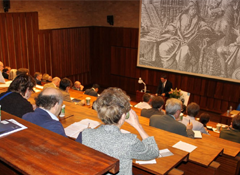
Rhodri welcomes delegates and introduces the conference themes
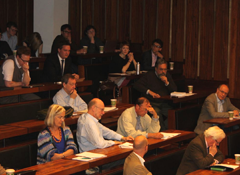
Our largest ever audience packs the lecture theatre
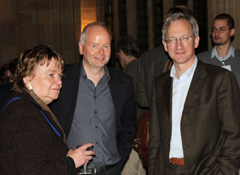
Constance Blackwell, Philip Beeley, and Howard Hotson
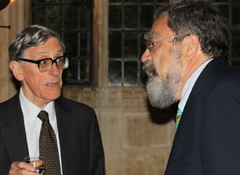
Sir Keith Thomas and Anthony Grafton at the Scaliger Reception
Particular attention was paid to the epistolary experiences of groups and networks rather than those of particular individuals – and the role of letters in constituting these communities of practice – and to the ways in which exchanges of letters coexisted with, supplemented, or competed with other kinds of knowledge production during the period. Delegates were also treated to a demonstration of our union catalogue of correspondence, Early Modern Letters Online (video now on our infrastructure page); no fewer than two publisher-sponsored drinks receptions toasting exciting new publications and partnerships (details here); and an array of quiches, sandwiches, and cakes of unusual deliciousness crafted by Trevor and Cristina from the Organic Deli Café.
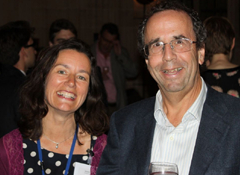
Miranda Lewis and Mordechai Feingold at the Scaliger Reception
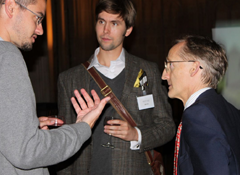
Leigh Penman, Alexander Farquhar, and Noel Malcolm
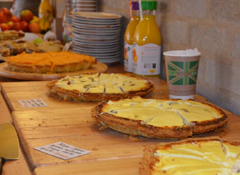
A conference marches on its stomach: artisan quiches

Sandwiches on home-made bread also exceeded scholarly expectations
Videos of most of the proceedings will be available shortly; in the meantime, for further information, including speaker profiles and abstracts, check out the conference microsite. Details of further events in 2013 and 2014 will also be available in the coming months; to stay informed, please join our mailing list.

 Those seeking to balance the port and mince pies this holiday season with some state-of-the-art reflections on early modern epistolarity are in luck: the latest issue of
Those seeking to balance the port and mince pies this holiday season with some state-of-the-art reflections on early modern epistolarity are in luck: the latest issue of  The
The 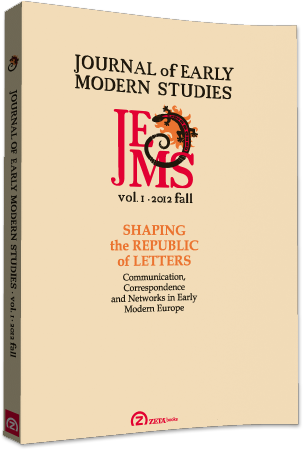
 is after contributions on the following themes: ‘International news; networks of news; news in transmission; translating news; war reporting; news from beyond Europe; forms of news; orality/manuscript/print; the uses and afterlives of news; old (and recycled) news; images of news; news and institutions; news and the state; news and the city; news readers’.
is after contributions on the following themes: ‘International news; networks of news; news in transmission; translating news; war reporting; news from beyond Europe; forms of news; orality/manuscript/print; the uses and afterlives of news; old (and recycled) news; images of news; news and institutions; news and the state; news and the city; news readers’.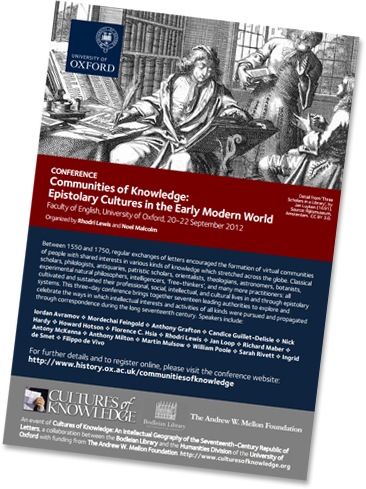









 Join
Join 